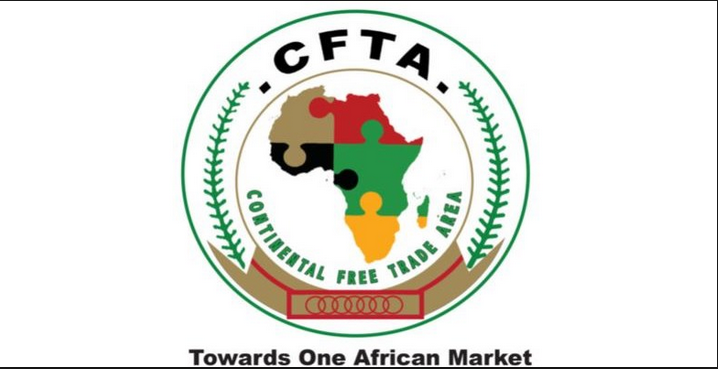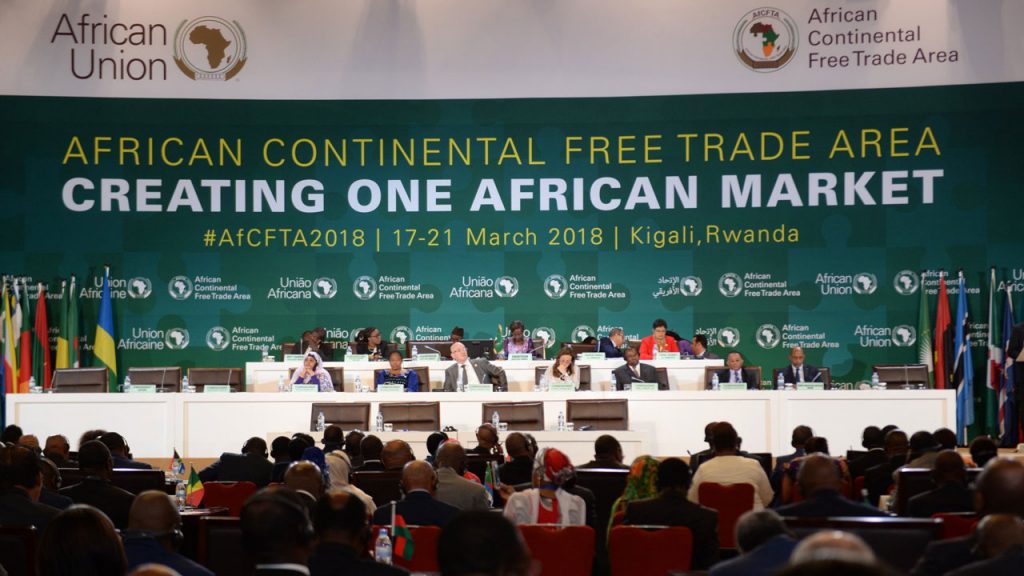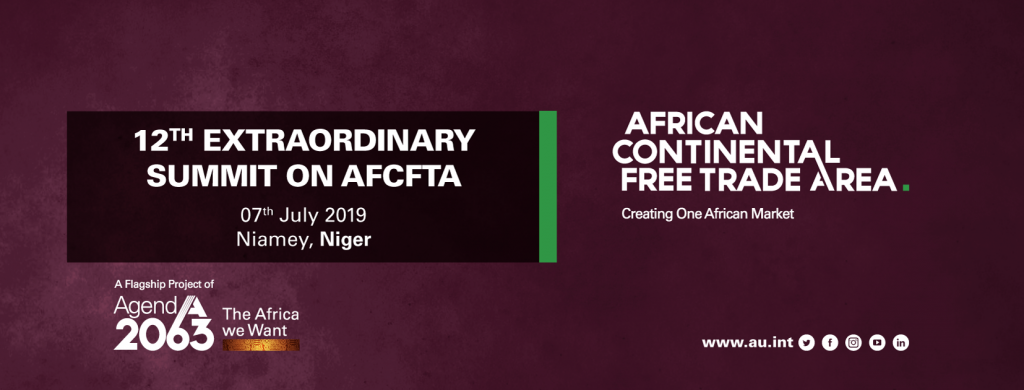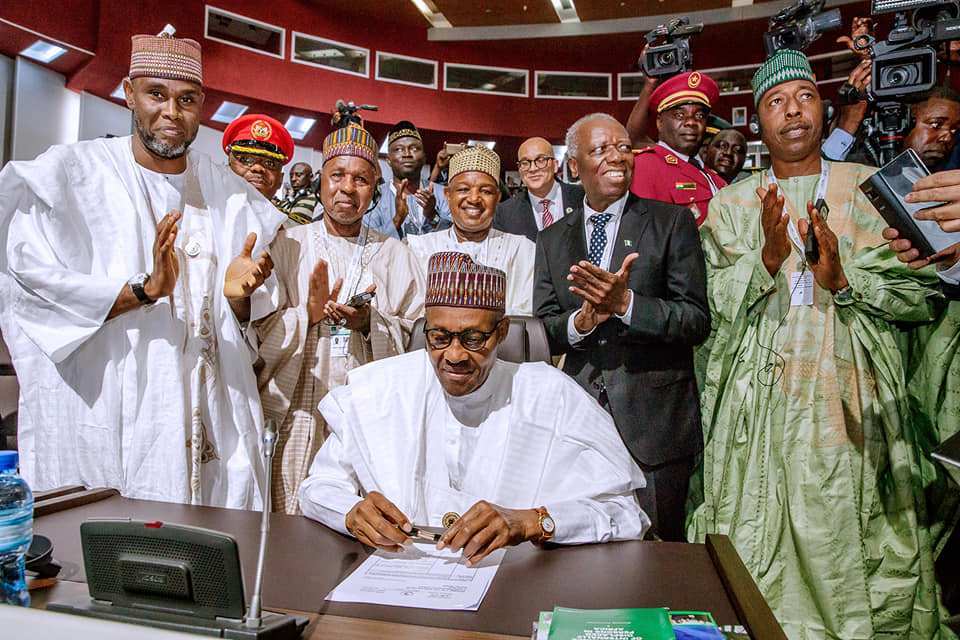49 days to the 400 year commemoration of Africans in the USA and the African Continental Free Trade Area
Just so you know one aspect of the dream of a United States of Africa through the African Union, that can be made real, it is 49 days to the 400th year commemoration of Africans in the USA.


On that day August 25th 2019 we will present our plan to join in with a African trading block, the African Continental Free Trade Area (ACFTA). We will do so as part of our #BlackFolksPlan

It took African countries four years to agree to a free-trade deal in March. The trade zone will unite 1.3 billion people, create a $3.4 trillion economic bloc and usher in a new era of development across the continent.
AfCFTA-Agreement-Legally-scrubbed-signed-16-May-2018Nigerian President Muhammadu Buhari and Benin’s President Patrice Talon on Sunday signed a landmark trade agreement ahead of the accord’s official launch at the African Union (AU) summit in Niger.

With the launch of the operational phase from July 2019, traders across Africa will be able to make use of preferential trading arrangements offered by the AfCFTA, with the understanding that the trade transactions are among the Member States that have deposited the instruments of ratification and those that conform to the provisions on rules of origin governing trade in the AfCFTA.”
It is also expected that at the launch, to be held at Heads of State and Government level, “The Assembly will decide on the location of the secretariat of the AfCFTA which will have the principal function of implementing the agreement. Seven member states: Egypt, Eswatini, Ethiopia, Kenya, Ghana, Madagascar and Senegal have submitted bids to host the secretariat.
During his opening remarks, Mr. Mahamat also reiterated the commitment of the AUC to work in close cooperation with the Permanent Representatives Committee, to strengthen the implementation of programmes, and to take immediate measures to ensure the recommendations of the internal and external auditors are implemented and enforced.
On a broader level, the African Union meeting in Niamey is considering other issues under the institutional reform programme that will allow the Union to achieve the vision and goals of its Agenda 2063 development framework. In its two day session from 4th to 5th July, the Executive Council will consider and adopt the African Union’s budget for 2020 and the legal instruments pertaining to the African Union Development Agency (formerly known as NEPAD), as well as reviewed the proposed new organisational structure of the AU Commission which is to be finalised by February 2020.
The Council will elect four board members of the African Union Advisory Board on Corruption (AUABC) and prepare the draft agenda and decisions for the 12th Extraordinary Assembly that will launch the AfCFTA. Additionally, it will discuss the scale of contributions to the AU Peace Fund. The Chairperson of the Commission announced that US$120 million out of the expected US$400 million for the Peace Fund has so far been received, and he expressed the Commission’s appreciation to member states for their contributions.
The Executive Council will also review the preparations for the 1st mid-year coordination meeting between the African Union and the Regional Economic Communities (RECs). In line with the Institutional Reforms agenda which recommended the rationalisation of the number of meetings held by the AU, a decision was made to have one summit per year, and a coordination meeting mid-year, instead of the previous two summits per year, in order to ensure the efficient implementation of AU summit outcomes and decisions. As this will be the first such meeting, discussions will centre on the drafting of the rules of procedure, drafting proposals on the division of labour between the AU, RECs and member states, and revision of the protocol on relations between the AU and the RECs.
Today’s opening ceremony was presided over by Mr Sameh Shoukry, Minister of Foreign Affairs of the Arab Republic of Egypt in his role as the Chairperson of the Executive Council, and was addressed by Niger’s Minister of Foreign Affairs, Cooperation, African Integration and Nigeriens Abroad, Mr Kalla Ankourao.

AU commission chairman Moussa Faki dubbed the African Continental Free Trade Area (AfCFTA) deal a “historic” moment.
It is part of a 50 year plan of Africa’s for the future – much more than a free trade deal, called Africa 2063. In October 2013 we attended consultations at the #AfricanUnion Mission to the UN HQ in NYC on it, and sat as Chair of the Economic Development Roundtable. We were only 1 of two organizations in attendence who brought to the table a trillion dollar funding plan. Ours based on part of the $16T of new #FederalReserve debt that President Obama could have issued for People of African Descent.
In 2019 Fifty-four out of 55 AU member states agreed to the deal in March, with only Eritrea holding out. It took African leaders four years (2015-2019) to reach an agreement on the continental free-trade zone, which is expected to usher in a new era of development in Africa.
The AfCFTA is the largest trade bloc since the creation of the World Trade Organization in 1994.
Focus on Africa
“The eyes of the world are turned to Africa,” Egyptian President and AU chairman Abdel-Fattah el-Sissi said at the summit’s opening ceremony on Sunday.
“AfCFTA will reinforce our negotiating position on the international stage. It will represent an important step,” he added.
#FAUchamber believes that the creation of a community benefit agreement, to be called #150BlackFolksPlan, driven by a public private partnership can be a solution for the fundamental injustice, cruelty, brutality, and inhumanity of African slavery in the United States of America (USA and or America) between 1789 & 1865 and the progenitors to the 13 American colonies between 1619 (On August 25th 1619, 20 Africans were brought to Point Comfort in the English colony of Virginia—we do not know if they were indentured or enslaved) & 1789.
It will address the damage incurred by past & current federal government racism against freed African Slaves in the USA from 1865 to 1868 & African Americans from 1868 to 2019. It will address effects subsequently de jure & de facto of institutional racial & economic discrimination at levels of government and in the private sector on the descendant Americans of African descent.
It will be a stimulus to the American Economy for all Americans. FYI, this year is historic because it in the 150th year African were handed a flawed citizenship on July 28th 1819. The problem was the institutionalized racism that came with it, so today we have 5% of the wealth of European heritage descent Americans whose ancestors also received their citizenship at the same time.
This solution will be built on the over $90B in established bank based community benefit agreements (#NCRCcba) in existence. FAUchamber is a signature to a $30B one that runs through January 2020.
We do this in line with the asperations of the 400 Years of African-American History Commission Act, signed into law January 8, 2018, established a 15-member commission to coordinate the 400th anniversary of the arrival of the first enslaved Africans in the English colonies.
To be Submitted by members of Friends of the African Union, the African Diaspora Directorate & allies and supporters will by August 25th 2019 develop the 150BlackFolksPlan as a Unsolicited Proposal to US State Dept. As a updated solution to the 2015 Universal Periodic Review of the United States (#UNUPR) of America for review and action by President Trump.
FYI even though the United States of America (#USA) Government withdrew from the UN Human Rights Council (#UNHRC) they are still going to do a UNUPR of the USA in 2020. Our civil society organization (#CSO) answer will be in line with our 2015 answer, solutions instead of declaration of our problems.